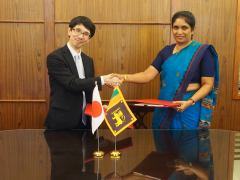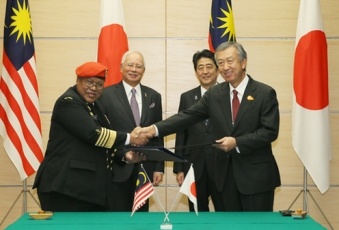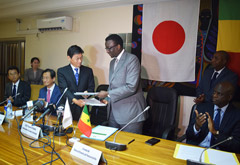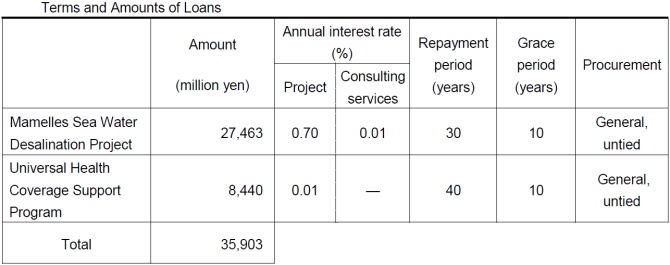Japan International Cooperation Agency [Tuesday, Nov 15, 2016]
50 Years on, Singapore and Japan Assist Developing Countries as Equal Partners
50 years after the establishment of diplomatic relations between Japan and Singapore, their relationship has evolved from Japan assisting Singapore to the two countries partnering to assist other developing nations.
Japan and Singapore established diplomatic relations in 1966, the year after Singapore's independence. Japan's ODA to Singapore began the same year. While making active use of assistance from Japan and the international community, Singapore has achieved remarkable economic growth. Japan ended its ODA to Singapore in 1996 and the two countries started a partnership program to transfer their accumulated technology and expertise to other developing countries.
During this anniversary year of 2016, JICA published a brochure entitled "History of Friendship and Cooperation" that summarizes Japan's ODA projects in Singapore.
After independence, the Singaporean police were troubled by an increase in crime due to rapid urbanization. So in 1981 they adopted a community policing system — based in part on Japan's Koban system — that emphasizes a relationship of trust with citizens.
The Singaporean police were able to gain the trust of local communities for reasons including 1. the awareness of the issues on the part of the Singaporean police and 2. the fact that Singapore evolved the system into one that matches Singapore's customs and culture, rather than simply adopting the Japanese system wholesale.
As a result, Japan and Singapore have been collaborating since 1995 to develop this initiative into third-country training programs for other ASEAN countries facing the same problem. Those programs have gotten positive reviews.
Also, JICA implemented a project to increase productivity in Singapore for seven years beginning in 1983. Singapore, which has learned Japanese-style management techniques, has since trained experts in productivity and become a world leader in it, and that expertise has spread around the world through a global network.
The Japan-Singapore Partnership Programme for the 21st Century (JSPP21), which supports human resource development in developing countries and is being implemented by the two countries together, has become a symbol of the cooperative relationship between Japan and Singapore. It combines the experience and expertise of the two countries to carry out third-country training for many developing countries in a wide range of disciplines.
Through synergy between the knowledge and experiences of Japan and Singapore, the two countries have achieved effective assistance on various issues facing developing countries. As equal partners who collaborate on projects, they are contributing to the development of such countries.
In addition to the Koban course discussed earlier, Japan and Singapore have developed such courses as "Maritime Safety Management" and "Disaster Risk Reduction and Management," and they are transferring to countries around the world including ASEAN the accumulated technology and knowledge of Japan and Singapore.
The brochure will give information on three projects, "productivity development" and "the Koban system," uniquely Japanese initiatives that are highly regarded around the world, and JSPP21 the two countries are collaborating on that support human resource development in developing countries. It will retrace how Singapore reacted to Japanese cooperation, how it absorbed and developed it and how it leveraged it to build up the modern nation of Singapore.
The project stories, in which multiple people related to Japan and Singapore appear, are extremely interesting and useful for learning about the friendship and cooperation between the two countries, and also about the country of Singapore.
Japan International Cooperation Agency [Thursday, Nov 17, 2016]
Signing of Japanese ODA Loan Agreement with Sri Lanka: Improving access to safe drinking water in rural areas through construction of water supply infrastructure
On November 17, the Japan International Cooperation Agency (JICA) signed a loan agreement with the Government of the Democratic Socialist Republic of Sri Lanka to provide a Japanese ODA loan of up to 23.137 billion yen for assistance for the Anuradhapura North Water Supply Project (Phase 2).
This project will construct a water supply system in the northern part of Anuradhapura District to provide safe drinking water and increase the water supply coverage, thereby improving health conditions and the living environment in the project area. The loan funds will be allocated to the civil works and the procurement of equipment necessary for the construction of a water treatment plant, the supply and installation of water transmission and distribution pipes, and consulting services.
Since civil war ended in 2009 after more than 25 years, reconstruction efforts have gone forward and steady economic growth, driven by service industries such as tourism, has been achieved. In order to achieve sustainable “quality growth” that benefits all residents, it is important to step up efforts to address challenges the country faces, such as improving the economic infrastructure, including the power and water supply, and improving the quality of social services in rural areas.
Sri Lanka has set a target of raising the piped water supply coverage from the current national average of approximately 45 percent to 60 percent by 2020. To achieve this target, not only do existing tap water facilities need to be expanded in cities, but new tap water infrastructure needs to be constructed in rural areas, where such infrastructure is insufficient. There are also regional disparities in piped water supply coverage in the country. As an example, the northern part of Anuradhapura District, which is the target region of this project in Sri Lanka’s North Central Province, has a tap water coverage of merely 26.9 percent. Moreover, this region has a high incidence of dental and skeletal fluorosis, which is caused by consuming groundwater with a high concentration of fluoride. It is also said that one of the causes of the high incidence of chronic kidney disease in the area is poor-quality groundwater. These health issues make the supply of safe drinking water to the region one of the country’s highest priorities.
The Anuradhapura North Water Supply Project (Phase 2) will increase the piped water supply coverage, and decrease the fluoride concentration of drinking water in the target region by constructing new piped drinking water supply facilities that use surface water as the water source. It is expected that the project will improve the public health and living environment of the residents in the target region.
Going forward, JICA will continue to contribute to the sustainable economic growth of Sri Lanka by supporting the development of basic infrastructure utilizing its various types of assistance—technical cooperation, Japanese ODA loans and grant aid.

Ministry of Foreign Affairs [Wednesday, Nov 16, 2016]
Exchange of Notes for the grant of patrol vessels and for the Grant Aid to Malaysia
1. Today in Tokyo, Dr. Makio Miyagawa, Ambassador of Japan to Malaysia, and Dato' Sri Ahmad Puzi, Director General of Malaysian Maritime Enforcement Agency (MMEA), exchanged notes for the grant of patrol vessels as well as for the grant aid for the Economic and Social Development Programme (grant amount: 700 million yen) from the Government of Japan to the Government of Malaysia.
2. Overview
(1) Grant of patrol vessels
Malaysia has important maritime routes including the Strait of Malacca and Singapore Strait, and the country’s economic and trade activities greatly rely on maritime transportation. Ensuring the safety and security of adjacent maritime areas is essential for Malaysia’s economic and social stability and further development of the living of its people. At the same time, it is extremely important not only for Malaysia and the neighboring countries but also for Japan, as our country much depends on international maritime transportation.
Against this background, a request has been made to the Government of Japan from MMEA for a grant of patrol vessels to meet its urgent need of enhancing its capacity for further ensuring the maritime safety and security.
Granting two patrol vessels currently owned and used by the Japan Coast Guard to the Government of Malaysia will greatly contribute to realizing Malaysia’s economic and social stability and better living of its people. This cooperation is also expected to help promote the “rule of law” at sea and to further strengthen the relations between Japan and Malaysia.
(2) Grant Aid (Economic and Social Development Programme)
This cooperation is intended to extend funds for the purchase of products, equipment and services by the Government of Malaysia that will contribute to the improvement of maritime safety and security. This cooperation is expected to contribute to the safety and peace for countries having trade with Malaysia and navigating the surrounding waters, including Japan, and to promoting the economic and social development of Malaysia.

Japan International Cooperation Agency [Wednesday, Nov 16, 2016]
Signing of Japanese ODA Loan Agreement with Senegal: Constructing desalination facilities and supporting expanded access to health care services for a better living environment
On November 15, the Japan International Cooperation Agency (JICA) signed loan agreements with the Government of the Republic of Senegal in Dakar to provide Japanese ODA loans of up to a total of 35.903 billion yen for assistance for two projects.
Since gaining independence in 1960, the Republic of Senegal has maintained a stable civilian government without a coup d’état. As a gateway to countries in the interior of West Africa, Senegal is a key location for the intraregional flow of goods and economic activity. On the economic front, the expanding public-private investment in such areas as agriculture, fisheries, energy, infrastructure and the mining industry has contributed to economic growth in the country. Supported by favorable agricultural production, the real GDP growth rate of Senegal has risen steadily from 2.8 percent in 2013 to 4.7 percent in 2014 and 6.5 percent in 2015 (IMF, 2016).
In February 2014, the Government of Senegal established the Emerging Senegal Plan, prioritizing strategies toward becoming a newly emerging nation by 2035 and aiming for an economic growth rate of more than seven percent starting in 2020. Three pillars of the plan toward meeting these objectives are: 1) strengthening growing industries and promoting economic structural reform through development to create wealth and employment (including strengthening exports and promoting investment), 2) improving the living environment, ensuring social security and sustainable growth, and 3) strengthening peace, stability, governance, freedoms and human protections while maximizing the national potential for development.
The characteristics of the Japanese ODA loans provided by these agreements are described below.
(1) Strengthening the water supply capacity through a desalination project in the Dakar Metropolitan Area
Some 80 percent of Senegal’s industrial activities are concentrated in the Dakar Metropolitan Area, which is home to a rapidly growing population of approximately 3.1 million people (2013), or more than 20 percent of the country’s population, on only about 0.3 percent of the land. The demand for water is growing rapidly in proportion to the rising population, and the current water supply cannot meet the maximum daily demand. With the population expected to grow even further, increasing the water supply is a priority. The Mamelles Sea Water Desalination Project will construct a new desalination plant (production capacity: 50,000 cubic meters of water per day) in Dakar, capital city of Senegal, the first such facility in the country, and will also improve the urban water pipe network. By diversifying the water supply resources and strengthening the water supply capacity, this project aims to improve the living environment for people in the Dakar Metropolitan Area.
(2) Promotion of universal health coverage in Senegal
In accordance with the United Nations Millennium Development Goals (MDGs) for 2015, the Government of Senegal has advanced measures in the health sector, including reducing the HIV infection rate and the under-five mortality rate. However, as of 2015, the under-five mortality rate (MDG4) was 47 per 1,000 births and the maternal mortality rate (MDG5) was 315 per 100,000 births, falling short of the MDGs of 44 (MDG4) and 127 (MDG5), respectively. There are also disparities in these statistics by region and economic level. Factors behind the lack of improvement in these indices include the challenge of physical access, particularly in rural areas where the few health care facilities that exist are often far away from users, and the challenge of economic access in which users of health care services cannot afford to pay for medical treatment. The objective of the Universal Health Coverage Support Program is to improve physical and economic access to health care services by promoting the establishment of health-related strategies such as financial policies providing financial support towards the achievement of universal health coverage under which everyone can receive appropriate preventative care, treatment, rehabilitation and other necessary health care services when needed at an affordable cost.

